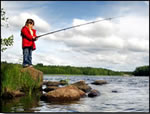
Read the full article here.
Good health is the foundation of a successful life. It is challenging to find or pursue your calling if you are struggling with poor health.
Maintaining optimum health requires considerably more significant investment than in prior generations. This is because of vastly increased health risks in our era from extreme toxicity in our environment and compromised immune systems due to GMO- and processed foods, chemtrails, and vaccines, and other factors that jeopardize our health. Because children are naturally strong, we run the risk of underestimating the proactive investment needed to ensure that their health is protected in a deteriorating environment.
Health-related gift-giving often entails helping a child’s parents financially, because they are the only ones who can make the day-to-day purchasing decisions that affect the child’s diet, exercise, and exposure to toxicity.
Examples:
- High-quality Food: Pay for or supplement family food bills up to a given amount per year.
 Clean Water and Air: Pay for the family to dig a well (if they own their home and the location, topography, and local land-use regulations permit) to provide water free of fluoride and other unhealthy chemicals. Where a well is not possible, pay for water testing and a whole-house or faucet-based water filter or filters. Purchase one or more air filters, particularly in any home in which a family member smokes. Have the home’s ductwork and/or chimney cleaned.
Clean Water and Air: Pay for the family to dig a well (if they own their home and the location, topography, and local land-use regulations permit) to provide water free of fluoride and other unhealthy chemicals. Where a well is not possible, pay for water testing and a whole-house or faucet-based water filter or filters. Purchase one or more air filters, particularly in any home in which a family member smokes. Have the home’s ductwork and/or chimney cleaned.
- Cooking Skills: Hire a nutritionist, dietitian, cook or others with excellent training in nutrition to develop family menus that will address children’s individual health issues. Keep the focus on providing a long-term, sustainable plan for meals that are palatable to sensitive taste buds, followed by lessons for children and other family members on how to prepare tasty dishes with nutritional ingredients. Consider replacing toxic cooking utensils, such as silicon-coated pans, with safer versions. Have china and glassware tested for lead toxicity and replace as necessary.
- Immune System/Detox: Pay for a full series of testing by a nutritionist, naturopath, or other alternative health practitioner to identify vulnerabilities, toxicities (e.g., allergies, heavy-metal poisoning, vaccine and radioactive toxins—any of which can cause attention deficit disorder) and other health conditions that may not be identified by traditional medical doctors or testing procedures. Follow up by paying for the recommended therapies indicated by the test results.
 Athletic Lessons / Equipment: Fund horseback riding, sailing, squash, soccer, lacrosse, gymnastics, ice skating, dancing, or similar group or private lessons or camps throughout the school year or during vacations and summers. People who do not have children of their own may not know that team sports and uniforms can cost hundreds of dollars per season. Buy or rent necessary equipment and clothing (including proper shoes). Hiring a personal trainer/tutor may be a sound alternative, especially for children who may be too far behind their peers for team sports or who have serious physical issues or handicaps.
Athletic Lessons / Equipment: Fund horseback riding, sailing, squash, soccer, lacrosse, gymnastics, ice skating, dancing, or similar group or private lessons or camps throughout the school year or during vacations and summers. People who do not have children of their own may not know that team sports and uniforms can cost hundreds of dollars per season. Buy or rent necessary equipment and clothing (including proper shoes). Hiring a personal trainer/tutor may be a sound alternative, especially for children who may be too far behind their peers for team sports or who have serious physical issues or handicaps.
- Health Club: Pay for a membership at a health club or YMCA that offers youth programs in exercise, yoga, swimming, and other health-related activities.
- Health Care: Offer to pay for the child’s health care bills or insurance deductibles and copayments, up to a preagreed amount.
- Support for Behavioral Problems: Provide for health care and other support and treatment to help children with a behavioral problem or an addiction. Support participation in programs for avoiding or withdrawing from using illegal substances or, if appropriate, Ritalin and other psychotropic drugs. This includes helping parents to replace disability payments they may lose if the child is healed or stops being medicated.
- Deleting TV: Make a contract with a child or family to reduce or end their TV-watching time in exchange for participation in local library programs or alternative activities and entertainmentthat you will fund.
Before school curricula were changed to graduate young men and women oriented toward becoming good consumers and corporate employees, children learned a much wider range of practical skills than they do today.
Supplementing school courses with a wide range of experiences and practical skills helps children become more self-sufficient and, therefore, more financially independent.These skills can also help children be supportive
of their immediate family.
Examples:
 Gardening: Help start a family garden or edible landscape so that children can learn how to grow their own food. If there is interest, help the children learn how to save their own seeds and create a seed bank to support the garden.
Gardening: Help start a family garden or edible landscape so that children can learn how to grow their own food. If there is interest, help the children learn how to save their own seeds and create a seed bank to support the garden.
- Planting Orchards: Help start a family orchard in which the children can raise, tend, and harvest fruit and nut trees, for both family consumption and resale. If the business develops, help the kids to participate in a local farmers market or roadside stand.
- Summer Language Lab or Trip: Make it possible for a child to live and study in other countries over the summer so that he or she learns a second language and becomes familiar with other cultures. Encourage and prepare children to work and live globally in order to take advantage of the full range of opportunities. Many high schools and most colleges sponsor or participate in programs for study abroad for a year or semester.
- Going Global Locally: As a first step before going abroad, try going global in your own backyard. Many of us live in areas of the country that enjoy rich diversities in family history and background. Find opportunities to organize children and parents of different backgrounds and cultures to tell stories and teach about their histories, cuisines, languages, and traditions.It is amazing how much we can learn about the world simply by sharing the richness of our varied histories and heritages within a school community or neighborhood.
 Raising Farm Animals and Livestock: Fund a flock or herd of farm animals and livestock that the child can tend and raise for resale, competitive showing, obtaining fiber for weavingor knitting, and/or providing food for the family.
Raising Farm Animals and Livestock: Fund a flock or herd of farm animals and livestock that the child can tend and raise for resale, competitive showing, obtaining fiber for weavingor knitting, and/or providing food for the family.
- Sewing: Buy a sewing machine and sewing instruction for an interested child. Knowing how to sew is a good skill to have within a family. It can help generate income and is useful for children who are interested in theater and the fashion and apparel industries.
- Amateur Radio: Help children learn how to build and operate ham and amateur radios. It will put them in touch with a variety of people and places around their region and the world, give them a skill that can be enormously useful in severe weather and natural disasters, and may help them qualify to work with local emergency responders.
- Apprenticeship: Help arrange a mentorship or apprenticeship with an adult who has expertise in an area of the child’s interest (e.g., a chef, an architect, an engineer, or a ship’s captain). This can create valuable experiences for both the mentor and mentee. Many trades are in danger of becoming lost arts, such as boat making, saddle- and harness making, clock making, stone carving, artwork restoration, tromp l’oeil painting, metal gilding, cake decorating, woodworking, and many more. These provide excellent areas of opportunities for an interested child.
- Energy Self-sufficiency: Learning about solar energy, geothermal energy, generators, biofuels, and other forms of alternative energy is time-consuming. Find out which of the teenagersin your family is passionate about these things, and pay for him or her to access the books and training needed to become proficient in that area. He or she can then lead the family inlearning how to become more energy-resilient and to integrate alternative energy in their homestead.
 Computer Skills: For children in high school, having a good computer and the time and training to develop skills in a variety of software packages can help with their education as well as provide part-time moneymaking opportunities. Computers also make availablr tool and database access for investment and economic research.
Computer Skills: For children in high school, having a good computer and the time and training to develop skills in a variety of software packages can help with their education as well as provide part-time moneymaking opportunities. Computers also make availablr tool and database access for investment and economic research.
- Astronomy: The opportunities in space and space travel are growing, so it is not surprising when children take a great interest in what is happening in the stars and planets around us. Helping children learn about astronomy, how to navigate by the stars, and how to use various navigation instruments provides them with an invaluable set of skills.
- Fiber Arts: For youngsters interested in weaving, knitting, and other fiber arts, a spinning wheel or spindle can be turned into a way to generate income. Fiber arts classes and guilds are a way to hone skills and meet others with common interests.
- Bike, Auto, and Small-machinery Mechanics: Why shouldn’t children know how to repair and take care of cars, bicycles, and the equipment and appliances that most of us use? The answer is—they can. Why not fund the purchase of tools and a secondhand bike and old car for a child to take apart and put back together again?
- Construction: If they have the interest, there is no reason why children cannot learn how to do basic home construction and repair by the time they have graduated from college. These are great skills for any career that involves project management, as well as real estate development and infrastructure engineering and construction—not to mention coming in handy forsummer jobs. A great way to start could be to hire a contractor to do work on the homestead on the condition that the contractor will agree to use one or more of the children on the job.
 Hunting and Fishing: Hunting and fishing, as well as learning how to handle firearms, are great skills for children interested in learning how to live on the land.
Hunting and Fishing: Hunting and fishing, as well as learning how to handle firearms, are great skills for children interested in learning how to live on the land.
- Summer Work Experience: As an alternative to camp, a farmer in Ohio provides summer work experience to groups of children. Reportedly, a former governor’s children participated in this program. Similarly, it is possible to spend part of a summer working on a ranch out west. An even more powerful experience would be to combine this work with some type of learning about how the money works in the ranch or farming operation. Alternatively, one could provide seed capital for investment in the type of commodities produced at the farm or ranch.
- Outward Bound: One of the best ways for children to learn how to deal with problems and stress is to train for them. Outward Bound is one such program, both in the United States and in other countries.
- Permaculture Certification: Fund a child to learn about and become certified in permaculture. This could be combined with a funding a trip to Australia or some other area where permaculture has flourished or by supporting a college-aged student’s time WWOOFing.
Providing gifts to fund a college savings plan is a great idea. However, it is a shame to see that money sitting in corporate and government securities for long periods of time when it makes more sense to gift that money now as an immediate investment in the children we love. This applies to building practical skills as well as to more formal education.
Read the full article here.


